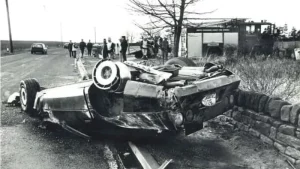Artists
Rick Allen: The Thunder God Who Defied the Odds

Rick Allen, the legendary drummer of Def Leppard, is not only known for his explosive drumming and defining the sound of 80s rock but also for his extraordinary journey of resilience. After a life-altering car accident that resulted in the amputation of his left arm, Allen defied expectations and continued to thrive as a world-class musician. His story is one of innovation, determination, and inspiration, making him a symbol of triumph over adversity in the world of rock and roll.
Early Life and Childhood

Rick grew up in a musical environment, with his family supporting his passion for drumming. He was heavily influenced by rock and roll from an early age, and his natural talent quickly became evident. He started playing the drums in various local bands before catching the attention of Def Leppard. Allen auditioned for the band in 1978 after his mother replied to an advertisement posted by the band Def Leppard with the headline, “Leppard loses skins”. At just 15 years old, he was chosen to replace the band’s previous drummer, Tony Kenning. From then on, he became known as “The Thunder God” for his energetic and powerful drumming style.
Career with Def Leppard

The success of Pyromania catapulted Def Leppard into global superstardom, especially with hit singles like “Photograph” and “Rock of Ages.” By this point, Allen had already established himself as one of rock’s premier drummers.
Car Accident & Amputation
On December 31, 1984, at the height of his career, Allen was involved in a devastating car accident. While driving with his then-girlfriend near Sheffield, Allen lost control of his Corvette C4, causing it to flip several times, hit a dry stone wall, and throw him away through his car’s sunroof while his left arm was entangled in the seat belt. His severed left arm was then successfully re-attached by doctors, but on 4th January 1985, due to infection, it had to be amputated. This tragic event could have ended his drumming career, but Allen was determined to continue.
“When I finally realized that I’d actually lost my arm when I came around in hospital, I really didn’t wanna be here and I didn’t want to see anybody.”
Overcoming Adversity: Learning to Drum with One Arm

Allen rejoined Def Leppard for their “Hysteria” (1987) album, one of the band’s biggest successes, proving that his disability hadn’t diminished his talent. Songs like “Pour Some Sugar on Me,” “Love Bites,” and “Animal” feature Allen’s unique drumming style, and his ability to innovate under pressure further solidified his reputation in the rock world.
Drumming Style
Even before the accident, Rick Allen was known for his powerful, precise drumming, combining energy with technical prowess. After the accident, his style adapted out of necessity. His footwork became more prominent, and the custom electronic drum kit allowed him to use his right arm for the snare and cymbals while his feet took on an expanded role, triggering other drum sounds.
Allen‘s ability to seamlessly blend acoustic and electronic drums helped Def Leppard maintain a modern sound that was integral to their success in the 1980s and beyond. His playing is known for its solid rhythmic foundation, a driving force in Def Leppard‘s hard rock sound, and his use of electronics has influenced drummers in rock and metal genres.
Legacy
Rick Allen is not only celebrated for his contributions to Def Leppard but also for his perseverance. His story is an inspiration to musicians and non-musicians alike, proving that disabilities don’t have to be limitations. In the years following the accident, Allen became an advocate for people with disabilities, sharing his story to inspire others. He’s been involved in various charities, including the Raven Drum Foundation, which he co-founded to support veterans, trauma survivors, and people in need of healing.
As a drummer, Allen‘s legacy lies in his innovative approach to overcoming adversity. He proved that rock music, often seen as a purely physical endeavor, could be adapted to suit different physical abilities. His role in Def Leppard’s continuing success, including the band’s 2019 induction into the Rock and Roll Hall of Fame, cements his place as one of rock’s most iconic drummers.
Here are a few videos of the Thunder God
How Rick Allen Uses Electronic Drums
Rick Allen’s Interview
Armageddon It
Rick Allen’s Drum Solo 2017
Just Like 73 (Live From The Summer Stadium Tour, 2024)
Rick Allen‘s story is one of resilience, creativity, and passion. He remains a legend in the rock world and a symbol of overcoming the odds.
“You know what? I can do this.’ It was really a collective thing. It was all this encouragement I was getting from other people, and then it just manifested in wanting to succeed. And that’s exactly where it came from.” – Rick Allen



